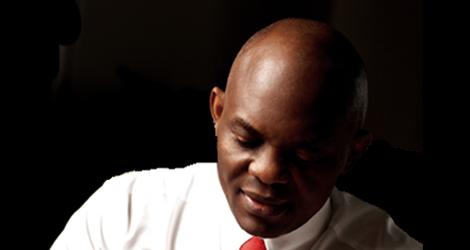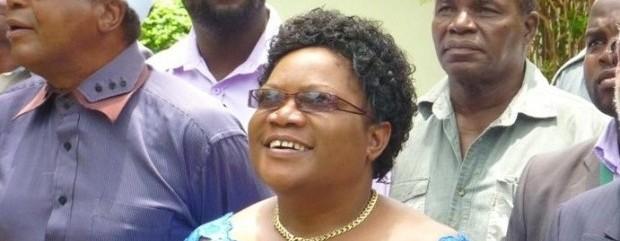The AU Panel in Ain Siro: “Are We Part of Sudan?”
Speaking earlier today to the members of the African Union High-Level Panel on Darfur, in Ain Siro village in North Darfur, one resident asked rhetorically, “Are we part of Sudan?” He felt deprived and forgotten, and deeply appreciated the chance to speak at length, without interruption, to eminent foreign visitors.

Four members of the Panel visited Ain Siro. They included, former presidents Thabo Mbeki of South Africa and Abdisalam Abubaker of Nigeria (shown left), and two distinguished lawyers, Justice Florence Mumba of Zambia and Mohamed Kebir of Nigeria. Rakiya Omaar also visited last month. Former President Pierre Buyoya of Burundi sent his regrets, as he was attending the funeral of President Omar Bongo of Gabon today. (I attended in my capacity as advisor.) The Panel asked the community to address four themes: peace, reconciliation, justice, and how Darfur relates to the Sudanese nation.
Ali Haroun was born in the village and is now a senior member of the SLM. He spoke last, after representatives of the native administration, women, youth and the SLM. “We welcome you in your land.” He repeated “your” for emphasis, making the point that all Africans should feel at home: “It is yours too. We are proud to welcome you to listen to the people of Darfur, freely and without interference.” After the prepared presentations, lucid and comprehensive, the villagers had a free-flowing discussion with the panel members. Hundreds of people turned up, crowding round the discussion, which was held in the shade of mango trees.

For Ali Haroun, the four issues seemed to boil down to one basic doubt. Asked about elections, he said, “We don’t know if we are part of Sudan.” What he meant was that many Darfurians were IDPs, refugees or lived in rebel-held areas such as Ain Siro, and had not been counted in the census, and expected to be excluded from voting and other citizenship rights. Speaking a few minutes earlier, Omda Abdalla Shallali made a similar point. “You have come from Khartoum. In these villages do you see anything like Khartoum. Are we part of Sudan? Do you see schools like our school in northern Sudan or the cities? Do you see clinics like our clinic? Have you seen any gas station here?”
Throughout the day, the debate came back to the question of economic neglect and lack of services. Ain Siro was not only deprived, but its people were denied fundamental rights, which they took as evidence that the Sudan government simply didn’t care about them. The question of the status of Darfur within Sudan was not only a question of political representation commensurate with its population, it was an issue of essential services and material rights on an equitable basis. Adam Babiker Suleiman, the humanitarian affairs coordinator, underlined that the basic demands for food and water were what had driven people to take up arms, and until there were guarantees that these basic rights would be fulfilled, they had no reason to consider making peace.

Realizing these rights was also a question of justice. While the villagers demanded that the international community pursue justice, from the most junior to the highest level, they also framed their demand for development and services in terms of justice. With a smile, Ali Haroun said that he did not expect the African Union to arrest President Bashir””he was well aware that “you have no capacity to arrest him.” He and others were polite but critical of the AU and what they saw as African leaders’ disinterest in the ICC.
Turing to reconciliation, the Ain Siro leaders stressed that they knew how to reconcile and did not need to be taught how to do it. They gave as an example the successful initiative to end conflict with the neighbouring Arabs. Omda Shallali explained, “We have no hostilities whatsoever with the Arabs. We have tried to understand our Arab neighbours and bring conflict to an end. We want to refute the government propaganda that Darfur is a tribal conflict. The Arabs were our enemies in the recent past, when the government used them as its right arm. We went through burnings, killings, rapes. But who directed them? It was the government. The mistake was made by the government, not them.” He and Ali Haroun both explained that the Arabs needed pasture and water for their animals, and there was no problem in sharing these resources and putting the past behind them.
Everyone who spoke longed for peace. For several years, Ain Siro has been the centre of efforts to bring together the divergent rebel factions, and the SLM leaders insisted that their efforts will continue. They were also worried about the government’s lack of concern for the welfare of its people and its repeated failure to fulfill agreements.
Abdul Mohammed, director of the Darfur-Darfur Dialogue and Consultation, spoke, “I can see the leadership here that has kept society together. I can see women, youth, children and the elderly. There is a community here and it has needs, needs that cannot wait for peace.” Certainly, Ain Siro is quiet. After its near-complete destruction in 2004, it has been largely rebuilt, and modest services provided based on voluntary contributions from the community. There is absolutely no reason why others should not assist: the school and clinic could be supported and developed, and why water, agriculture and veterinary services could be provided. Perhaps an indication of the government’s seriousness about peace will be its readiness to use its resources on restoring basic services and beginning long overdue development, in all parts of Darfur.
One of the many impressive things about the Panel’s discussions in Ain Siro–a big community meeting, a smaller group discussion, and informal talks–was the community leaders’ sense of realism and reciprocity. They did not have unrealistic expectations for what the international community could do””and knew that asking for too much was a recipe for disappointment. While they requested aid for the basics of life, they also discussed in detail what they could do themselves to further peace and reconciliation. President Mbeki left at the end of the day, quietly impressed with the political maturity of the leaders of this remote place.






